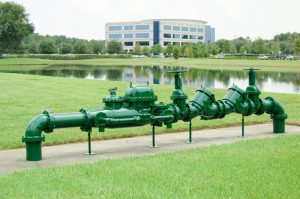 If you’re a commercial business owner or property manager in the greater St. Louis area, then yes, yes your backflow prevention device is really that important.
If you’re a commercial business owner or property manager in the greater St. Louis area, then yes, yes your backflow prevention device is really that important.
This device is one that protects the health and safety of residents throughout your community. Regulations do vary on backflow prevention depending on your area, but generally speaking most commercial properties should have a backflow prevention device on their property.
You likely do have one of these systems on your property already, but are you properly caring for it? Keeping the potable water supply safe by doing your part and schedule routing backflow testing is part of your responsibility as a commercial property owner or manager. Read on to learn more!
Schedule Annual Backflow Testing
Testing requirements vary from city to city, but most communities throughout the St. Louis area are required to get backflow testing done once a year. This means that your backflow prevention device needs to be tested to ensure it’s working as it should and that the potable water supply surrounding your property is protected.
Even if the backflow testing regulations in your area are relaxed, we still suggest that you schedule backflow testing at least once a year. If your system were to fail, potentially polluted water can move back up through the pipes and contaminate the municipal supply.
“Can My Backflow Device Be Damaged?”
Yes! Backflow assemblies contain a series of mechanical valves. And like any other mechanical system in your home, these valves can fail, leaving the potable water supply more vulnerable to pollution.
Backflow devices are developed to make it so the water can only move in one direction. And the water entering through the backflow assembly may contain enough debris to damage the valves. Even the smallest amount of calcification or debris can prevent the entire system from functioning as it should.
Only Trust Certified Backflow Testers for Your Annual Inspect
In most parts of the U.S., our area included, backflow testers require certification, if you want the test to hold up. If you are required to report back to the city in order to verify that you’ve met testing requirements, the plumber that conducted the test must be within their database. Ensure that you only work with a certified backflow tester for your annual service by calling our team.
Dispelling a Backflow Myth
Most residences are not required to have backflow prevention because they’re really not at risk. The only time they might be is if they have an irrigation system. There’s a common misconception that commercial buildings only need backflow testing if they have an irrigation system. This isn’t the case—it is still possible for contaminated sources to enter the public water supply even if you aren’t using an irrigation system.
One way backflow occurs is through back-siphonage, when pressure drops on the supply side. If, for instance, firefighters were to use a fire hydrant on your street, it could create a sort of vacuum that sucks in contaminated water that’s pooled around an outdoor fixture or sprinkler head, enabling the contamination to get sucked back in.
For professional commercial plumbing in St. Louis, MO, contact Performance Plumbing today!
